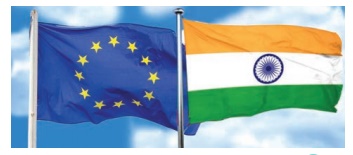Chapter: 12th Political Science : Chapter 9 : India and the World
India-European Union Relations
India-European Union Relations

The period of colonialism ushered in a time of
intense contact between India and Europe. Even people belonging to non-colonial
European nations came to India to “work among the masses” or to study Indian
culture, and their contributions to social development, education and
healthcare in India are significant. There was not only an exchange of ideas
and technology, but the culture and ethos of both these entities were mutually
influenced, notwithstanding the fact that this was a period of economic
exploitation of the colonised by the colonisers. One of the things that
permeated the Indian ethos was a sense of nationhood, which soon, by the early
20th century, led to an overwhelming desire and movement for independence.
In 1498, Portuguese sailor Vasco da Gama
succeeded in finding a sea route to India from Europe which opened the doors for
direct trade between Europe and India.

Post-Independence (1947-Current)
By the end of World War II, the European powers
were no longer in a position to continue to stay in control of the Indian
sub-continent and so withdrew, leaving colonial India as two nations, divided
on the basis of religion.
BREXIT (Britain’s Exit)
After months of negotiation, the UK
and EU agreed a Brexit deal at Brussels summit.
What is Brexit?
Brexit is a term used to denote
Britain’s Exit.
·
Brexit is the withdrawal of the
United Kingdom (UK) from the European Union (EU), following a referendum held
on 23 June 2016 in which 51.9 per cent of those voting supported leaving the
EU.
·
The invocation of Article 50 of the
Lisbon Treaty set a two-year process which was due to conclude with the UK’s
exit on 29 March 2019.
·
On 21 March 2019 the European Council
agreed to the UK’s request to extend the deadline and extended it to 12 April
2019.
After Independence in 1947, India continued to be
closely involved with Europe, primarily with the UK, as part of the
Commonwealth of Nations. India’s relations with the rest of Europe were hued by
the Cold War. India espoused a Non-Aligned stance which was viewed with
distrust and her closeness to the Soviet Union after the war with China in 1962
led to a further schism. Engagement in trade, technology, education did exist
but were in low key till India instituted liberalization in 1991.
In 1994, the India -EU Cooperation Agreement was
signed which made India one of the first countries in the world to engage with
the EU as an entity. In 2004 the EU-India Strategic Partnership was concluded.
However, the attempts since 2007 to arrive at a free trade agreement have been
deadlocked since 2013. The EU was India’s largest trading partner in 2018-19
with USD 104.3 billion in bilateral trade, but BREXIT might impact that going
forward.
Another issue in the EU-India relationship which
the Common Agenda on Migration and Mobility seeks to address is preventing
illegal migration and streamlining mobility for citizens.
The EU and India have some common interests other
than trade – preventing climate change, maintenance of the Iran nuclear deal,
increased cooperation in education and technology including nuclear energy. The
EU model of federal democratic government with devolved state power should be
of interest to India who has to deal with a federal structure and a
multicultural society too.
Activity
India- European Union
Why India needs
resources and expertise from the European Union? Discuss.
Related Topics